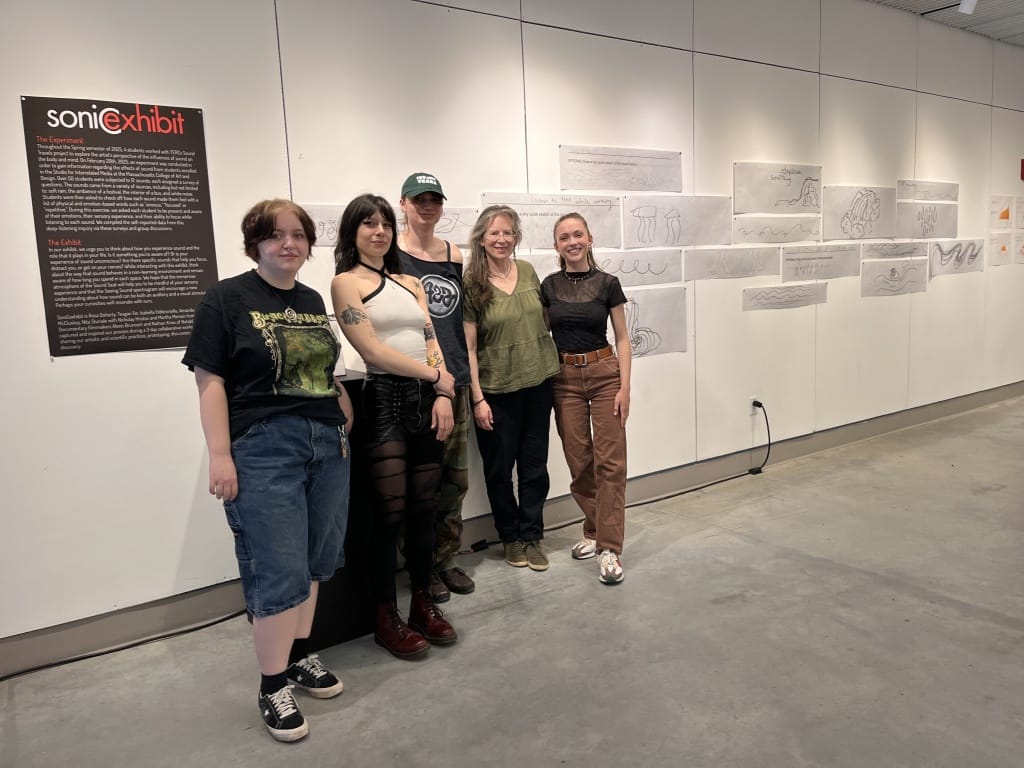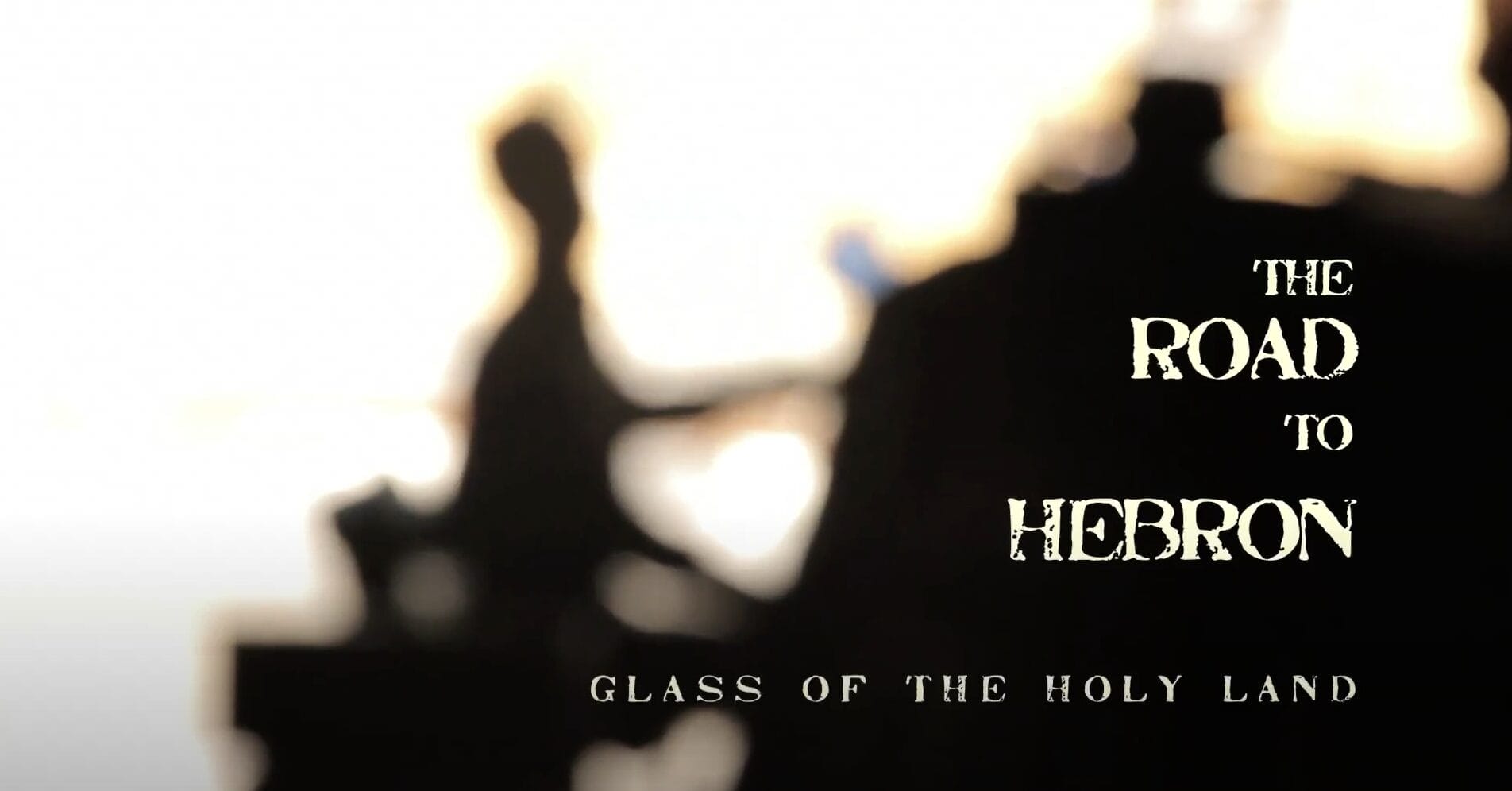MassArt Students and Alumni Combine Forces to Tune Into the Science of Sound
MassArt and TERC bring creative installations together with research on soundscapes and learning.
View story

How a twist of fate led the Chair of Fine Art 3D to this year’s Venice Biennale—by way of Istanbul, Jerusalem, and Hebron.

James McLeod and his wife and co-producer Libby with friends at Venice Biennial Personal Structures | Beyond Boundaries exhibit. Artwork: James McLeod, Paradise lost, Vitreous Enamel on Glass, 2024.
How a twist of fate led the Chair of Fine Art 3D to this year’s Venice Biennale—by way of Istanbul, Jerusalem, and Hebron.
James McLeod, Chair of MassArt’s Fine Art 3D program, has received numerous accolades in the course of his glassblowing career: exhibitions throughout the United States and internationally; having his works chosen for the permanent collections of signature glass museums; and receiving favorable mention in multiple publications. Now he has been selected for inclusion in the 2024 Venice Biennale — one of the most influential and prestigious international contemporary art exhibitions in the world. We caught up with him to learn more about this latest achievement.

2024 La Bienale Vicenze (Venice Biennial). Photo: James McLeod.

Artwork: James McCleod’s Paradise lost, Vitreous Enamel on Glass, 2024. Shown in the Personal Structures | Beyond Boundaries exhibition at the Venice Biennial.
Q: Being part of the Venice Biennale is an exceptional honor. How did your art come to be chosen?
James McLeod: I think I was contacted in part because of my position at MassArt. The European Cultural Center reached out and asked if I had any work I wanted to propose for the exhibition. I had a project that had been asleep for a while, and I thought this was a great opportunity to finish the series. It’s images and photos of life in Hebron that I printed on glass panels made with fusing and enamel techniques. My wife Libby partnered with me, taking some of the photos.
Q: What brought you to Hebron?
James McLeod: This was back in 2013. I had just finished leading a MassArt student group in Turkey — two weeks of glassmaking, and then we went around exploring the contemporary art world. The cousin of someone I was teaching with came to Istanbul while I was there — and on a whim I said I would visit her in Jerusalem. She was stationed there with the United Nations. But as I was about to fly over, she got pulled to the UK on a project. She did say, though, that someone in her office works on cross-cultural projects between Israel and Palestine and tries to pair people. ‘He will take you into a town in the West Bank and drop you with a family there for five days,’ she told me. ‘They have a glassblowing studio; they’ve been wanting to collaborate with somebody for a long time.’
Q: Then what happened?
James McLeod: I stayed with a glassblowing family in Hebron—their last name is Al Natsheh. The vision of the man who headed the enterprise was that I would come as somebody who may have had more world experience in glass and share what I knew. But when I got there it was clear within seconds that I was the student, the apprentice. It wasn’t that I didn’t have anything to offer, but I saw that it was my role to observe and learn.
Q: What do you mean?
James McLeod: This is one of the oldest glassblowing families in the world, dating back a couple thousand years. They have taught themselves how to work many times faster than we do, and with fewer resources – all recycled bottle glass. There are all these little tricks and techniques. For instance, we have these big fancy work benches; they work entirely on their laps. There used to be glassmaker artists all over Hebron. As far back as the thirteenth century it was called the crystal city. One of the things I discovered was how to make handles there with better consistency. Because of what I learned there, I can now work through everything much more quickly with far fewer tools. What they taught me puts more control in my own hands.
Q: What was it like to be there?
James McLeod: I thought it was going to feel very dangerous. And there are certainly tense parts everywhere. But it felt remarkably normal. This was a family that has just found a way to stay their course, to pursue their craft, and go on with business as usual and just exist in their world. Their attitude is, ‘We’re glassmakers. This is what we do.’ They’re looking for more ways to sell their work.
Q: How might that happen?
James McLeod: For one thing, the border’s very porous if you’re not Israeli or Palestinian, although even there glassblowers from the two cultures try to make friends. But if you’re from somewhere else you can just hop on a bus from Jerusalem to Hebron. A year later I went back and taught in Jerusalem at the Betzalel Academy of Art. As an American I could go back and forth.
Q: What’s next for you?
James McLeod: I’m finishing up working on a film about the Al Natsheh family that I’ve been collaborating on with a filmmaker — I received a MassArt grant to do this, and the school loaned us all the equipment — and it will be shown at the Venice Biennale later this year. I’m hoping to screen it here on campus, too. I’ve also been spending time on the island of Anguilla in the Caribbean’s West Indies.
Q: What’s going on there?
James McLeod: I’ll be bringing two mobile glass studios down there at the end of the year to work with both private companies and the government in order to pioneer a recycling initiative on the island, showing how to take glass and turn it into something else so they don’t have to import as many things from overseas.
Q: Can you give an example?
James McLeod: The island’s industry is 90 percent tourism, so there are a lot of used alcohol bottles. You can process that glass back into sand and then reintroduce the sand into the construction industry as a component of concrete. Currently, all of the sand for construction is brought in primarily from West Africa because the sand on the island is needed for the beaches. By turning recycling glass into sand, they can offset those expensive imports.
Q: Wow, that’s fantastic. Did you ever imagine when you were younger that this could be your life, not only creating art as a glassmaker but also traveling to different lands to learn, to teach?
James McLeod: When I was younger, I applied to MassArt as my first-choice college when I was a senior in high school and didn’t get in. I had come out here from California with my parents and toured the campus. Not being accepted was a big disappointment. So no, I didn’t know where life would take me. I just knew I had to keep making my art. From there, fate collaborates with your intentions.
The Venice Biennale 2024 runs through November 24th.

The Road to Hebron: Glass of the Holy Land premier will take place at the Biennale in Late Summer, 2024.
MassArt and TERC bring creative installations together with research on soundscapes and learning.
View story
MassArt Museum joins Boston Public Art Triennial, featuring Nicholas Galanin and other MassArt artists in bold contemporary works.
View story